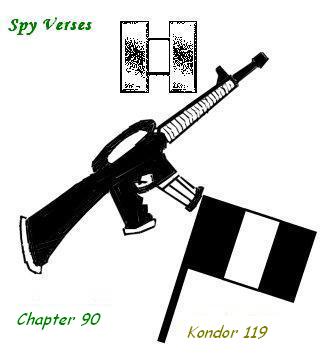
Patreon or PayPal Me keeps this site and its author alive. Thank you. |
Stories from the Verse
Spy Verses
Chapter 90: Kondor 119
Table of Contents
Previous chapter: Chapter 89: Brown 137

“I just wanted you to know you hadn’t been forgotten.”
These words from Lieutenant Vargas put Kondor at ease quickly.
“Thank you, Lieutenant. I gather there’s no news yet?”
“Nothing yet. Are you settled in all right?”
“Oh, yes, indeed, no complaints--better than many places I’ve been assigned.”
Vargas apparently did see the joke in that, and smiled. “Well, if you need anything, let me know.”
“Absolutely; and if you need me to do anything else, I’m here.”
Kondor was intrigued by the security on the inventory. It wasn’t as if there were no security at all. It was simply very relaxed. You could not simply walk into the munitions depot whenever you wished and walk out with whatever you chose, even if it quickly proved simple enough for Kondor to pass the security check points, particularly if he had what appeared to be official paperwork in his hands. No one wanted to look too long at official paperwork; it was just time-consuming red tape that was usually cut for the convenience of everyone involved. It took less than a week before the guards knew the new captain well enough to wave him through. They did check paperwork when you were removing something either expensive or dangerous, but in the most cursory of ways, making sure that your papers and their papers said you were taking the same thing, and it looked to be what you were taking. He probably could have taken a crate of fifty caliber bullets with paperwork that called for forty-five caliber, but there wouldn’t be much point to that--and it would be one of those mistakes that he was finding in inventory.
These were the first people he started to get to know, because removing inventory of that sort required interactions. At the present time, there were a dozen or so guards, of whom four were officers--a Captain Meyers, and Lieutenants Aaronson, Adams, and Smith. He smiled at Lieutenant Smith because the name was Ezekiel Smith--the same name he had been given when he was working on the gravity project in that other universe. Smith looked nothing like him, but he liked the guy and thought he’d like to get to know someone who shared one of his fictional names. He also learned that they only stayed on their posts for about four months, rotating to other positions and working with different crews, so that they couldn’t easily build a collusive group to pilfer inventory.
He had graduated beyond inventory. The warehouse crews had seen him working on inventory and asked about him, and managed to get him assigned to assist with filling orders. That gave him more flexibility, as he was now both stocking and pulling stock, and so could rather freely explore the base, or at least the supply storage sections.
He had filled in a lot of details on the world. There were forty-nine states, including Cuba, which had become a territory and then a state following the Spanish-United War; Alaska belonged to the Soviet Union, and Hawaii was a United States of America territory--which called itself “United” and its people “Uniteds”. The Soviets apparently offered to sell their worthless North American territory to the Canadians--either no one knew about the gold and oil, or no one thought it could be mined at reasonable costs. The Union of Soviet Socialist Republics was referred to usually as the “Ess-Ess-Ess-Er”, pronounced almost like “S Assessor” (although sometimes snidely as the “See-See-See-Pee”, the English understanding of those Cyrillic letters). World War II had been very much as he had learned it, although many of the names were different. Much of the Cold War tension that ended when he was in grade school existed here, with Soviet satellite countries part of an “Eastern Bloc”. What he thought had been called the “Iron Curtain” here was called the “Line in the Dirt” (less poetic, certainly, but it made some sense). China was still a theocratic monarchy, and the only tensions in Asia were between the Mongolian-Chinese border; the Soviets controlled Mongolia as a client state. There were fears in Europe, but no actual action; there were more serious problems in Africa, where subversives worked toward local uprisings among impoverished natives, often against upper class descendents of European ancestry. United had to tread carefully in that region, because there were factions in Europe that felt conflicting obligations to stop communism and to protect persons with ancestral ties to Europe, but United recognized that the more recently independent countries of the region were being run primarily by the wealthier and more educated Europeans on the backs of the poor indigenous peoples, and that this had to end if only to succeed in stopping communism, even if it meant the local rich and powerful losing a lot of wealth and power in the process. That was a hard message to sell, even in Europe, and the Uniteds were careful to soft-sell it.
It also meant keeping well-armed forces around the world, and keeping them stocked. Fort Porthos shipped a lot of material to a lot of bases. It might not be critical to the operation, but it was significant.
There is a behind-the-writings look at the thoughts, influences, and ideas of this chapter, along with twenty other sequential chapters of this novel, in mark Joseph "young" web log entry #257: Verser Relationships. Given a moment, this link should take you directly to the section relevant to this chapter. It may contain spoilers of upcoming chapters.
As to the old stories that have long been here:

